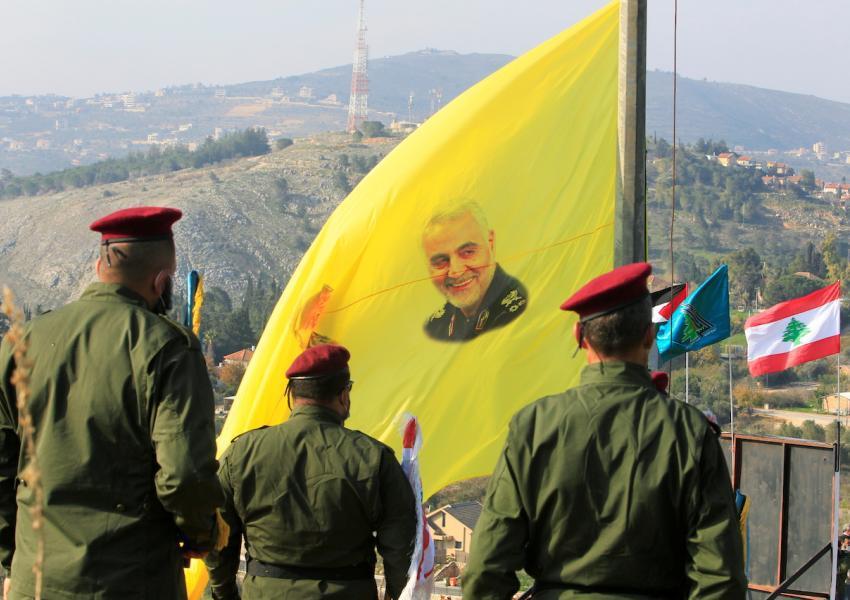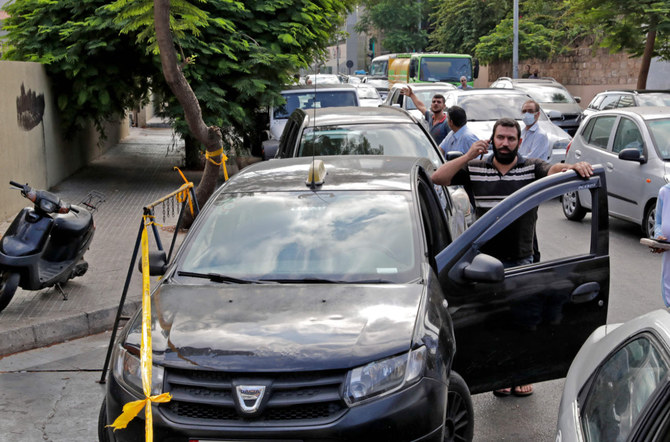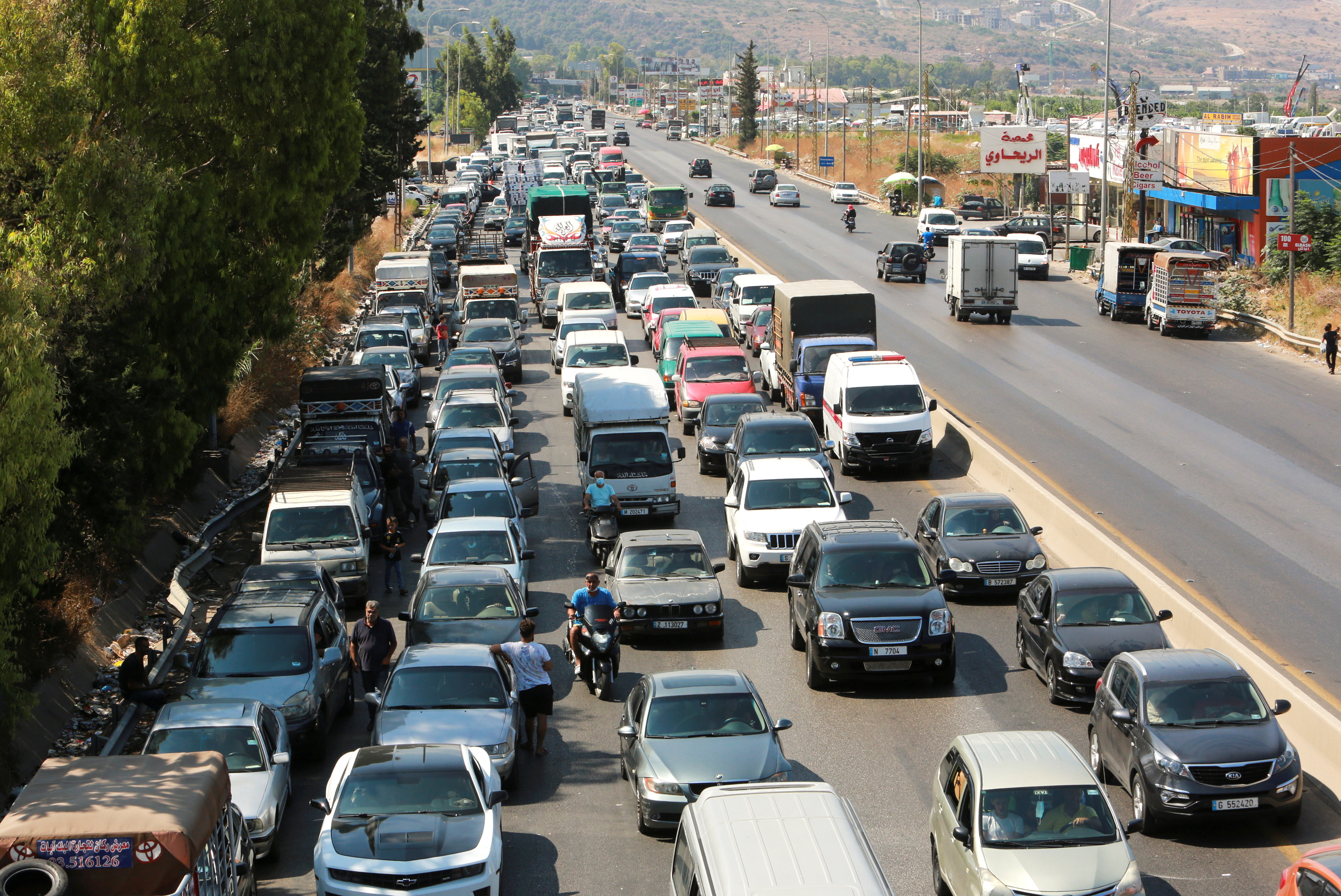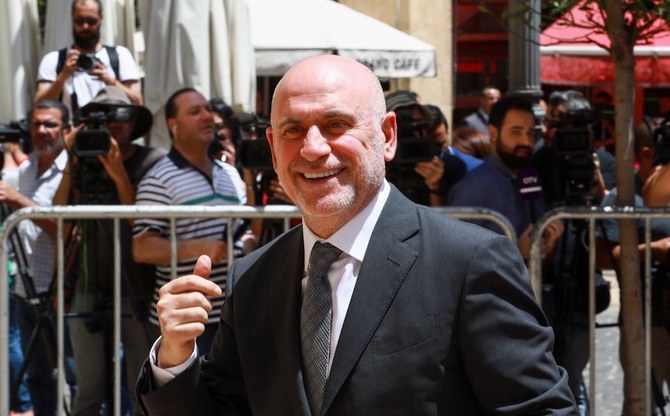by National News Agency — Maronite Patriarch Bechara Rahi urged officials to stop torturing and manipulating citizens’ feelings and put an end to the approach of obstruction and stalling in regards to the government formation. “Stop tampering with the fate of the homeland and the state, dropping one cabinet line-up after the other, and creating […]

this is an opinion article written by Bryan E. Leib & Maria Maalouf — the opinions are not necessarily views of khazen.org
The combination of Ebrahim Raisi (Raeesi) taking power in Iran and the weakness coming from President Joe Biden could lead to a major conflict between Hezbollah and Israel, a conflict in which many innocent lives would be lost on both sides. Hezbollah has a lot to be celebrating these days. Inside Lebanon, it is celebrating its victory in further entrenching itself in all facets of Lebanon’s government with the recent appointment of Najib Mikati as the next Prime Minister of Lebanon(link is external), supported by Hezbollah. This Iranian-backed “political party” which in fact is a US designated FTO (foreign terrorist organization) is also celebrating the presidency of a hardliner in Iran. During Raisi’s inauguration, the deputy secretary-general of Hezbollah shared the front row with other senior officials from US designated FTO’s such as Hamas and Palestinian Jihad. With Raisi taking power, we predict that Hezbollah will continue its strong-arm tactics inside Lebanon, on Israel’s northern border, and look to further expand its grip on power throughout the Middle East because that is what proxies do – they listen to their boss. Let us be clear – Hezbollah doesn’t make any significant moves without securing Iran’s blessing. They do what they are told because if they don’t, they know that Tehran will cut off the flow of money and weapons.
Iran’s Supreme Leader Ali Khamenei has a vision for the Middle East, and he executes this vision through militant proxies. The sad reality is that the Islamic Republic of Iran seeks to push the entire region into further chaos and into a protracted war with Israel. All of Iran’s terrorist proxies share in Tehran’s vision to eradicate Israel and create chaos in the region. The silent sympathy of President Michel Aoun is a testimony to the inability of any Lebanese political force to stop this dangerous Hezbollah-Iran nexus that has stripped the country of its sovereignty and plunged it into a death spiral. Meanwhile, the Biden administration and the French government have called on Israel and Hezbollah to exercise restraint and refrain from military escalation. These words have not been backed up by tangible actions. Immediately after these calls for restraint, Hezbollah leader Hassan Nasrallah declared that the current dynamic between his militant organization and Israel is a throwback to 2006, which witnessed the last serious military confrontation between the two. In addition, Nasrallah’s deputy, Naiim Qassem, met with the Commander-in-Chief of the Islamic Revolutionary Guard Corps (IRGC) Hossein Salami, and reiterated that, “the grounds now are ready for the collapse of the Zionist entity. If any error is committed on its [Israel’s] part, the new war will be launched, and it will be the death war for it.”
Hezbollah is signaling to its patron in Tehran that they are ready, willing and able to launch an attack on Israel. This should come as no surprise to anyone because with Raisi taking power, Tehran’s support for Hezbollah might be increasing. After all, Raisi a hardliner who is loyal to Khamenei. While these reckless and dangerous statements are threatening to drive Lebanon into a state of chaos, the possibility of a political-economic recovery has been diminishing as well, as the country is pushed further into Iran’s orbit. Hezbollah is funded by Tehran, and the Islamic Republic spends anywhere from $500 million to $1 billion annually on its apparatus and operations. This is a significant increase from the $100 million it used to receive from Iran in the 1980s. In addition, Hezbollah has been capable of freezing the economy and society in Lebanon by challenging the government and ultimately deciding who the next prime minister should be.

By Najia Houssari — arabnews.com — BEIRUT: Three radio stations and a TV channel in Lebanon have been forced to temporarily suspend broadcasting due to the country’s fuel crisis, with a government minister saying she had requested support for media outlets but to no avail. Information Minister Manal Abdel Samad said: “Even Radio Liban, which speaks on behalf of the state, stops broadcasting whenever the electricity is cut off from the transmission centers spread across all Lebanese territories, and the government-owned Télé Liban (TL) will gradually stop broadcasting. The TL administration said that broadcast is being suspended between midnight and seven in the morning in order to save on fuel.” She added that she had “sent letters to the minister of energy and the army commander, requesting support for official and private media institutions, but neither responded.” Radio Sawt El-Shaab, which is not affiliated with any political party, announced on Friday evening that it would temporarily suspend its programs due to the fuel crisis and because its guests could not reach its headquarters in Beirut. Radio Al-Sharq and Future TV, both of which are affiliated with the Future Movement political party, also suspended broadcasting. Radio Al-Sharq’s director, Kamal Richa, told Arab News: “The radio station, which was established in 1994, has never stopped broadcasting. But we had to turn off our generators due to the shortage of diesel, and the broadcasting stopped a few days ago.”
Both outlets are owned by former Prime Minister Saad Hariri. They faced a severe financial crisis years ago that led to a large number of employees being laid off and TV content being limited to shows from the archive, while 22 employees remain at the radio station. Richa added: “The radio administration secured on Saturday a quantity of diesel and informed us that we can resume broadcasting on Sunday, starting at seven in the morning. However, we might have to stop broadcasting again, as nothing is guaranteed in Lebanon.”
On Tuesday, Lebanese Army Command announced that “a three-day crackdown” carried out by units in various regions had resulted in the seizure of 4,392,725 liters of gasoline and 221,140 liters of diesel that had been stored for smuggling or for sale, either on the black market or at high prices after fuel subsidies were lifted. “The owners of these quantities were obliged to either sell them at the subsidized price or they would be seized and given to hospitals, bakeries, and private generators that have stopped working or are about to stop,” it said. The Audio-Visual Media Workers Syndicate appealed to Abdel Samad “to seek with those concerned to find a special mechanism that allows workers to obtain gasoline, to facilitate the task of media professionals.”

BEIRUT, (Reuters – Laila Bassam) – Lebanese fuel prices are expected to double after the state decided on Saturday to change the exchange rate used to price petroleum products in a bid to ease crippling shortages that have brought Lebanon to a standstill. Amounting to a partial reduction in fuel subsidies, the rise will mean more hardship in a country where poverty levels have soared during a two-year-long financial meltdown that has wiped more than 90% off the value of the Lebanese pound. The decision was made at an emergency meeting attended by the president, central bank governor and other officials over a fuel crisis that has left Lebanon in chaos, paralysing basic services and sparking daily melees as people scramble for fuel. Though prices will rise, the decision did not fully lift the exchange rate for pricing fuel to the exchange rate at which the central bank will finance its import – a gap which the state will continue to finance, for now.
A statement said the central bank will open an account to for that purpose up to a maximum of $225 million until the end of September – funds the government will have to pay back in the 2022 budget. The account was to cover an “urgent and exception subsidy” for gasoline, fuel oil and cooking gas, the bank said. The fuel subsidy would only continue until the end of September, a ministerial source said. President Michel Aoun confirmed the treasury would bear the cost of the continued subsidy.

By TAREK ALI AHMED — arabnews.com — BEIRUT: “How’s your Tuesday going?” reads the caption on an Instagram post, featuring a Lebanese woman sprawled on a sun lounger beside a glistening pool, showing off her tanned legs under a bright Beirut sky. For most people in Lebanon, Tuesday was the same as any other day in recent months — hours spent waiting in line at the petrol station, queuing for subsidized food products at the supermarket, topped off by a long, sweltering night’s sleep on the balcony during yet another blackout. But a brief scroll through the feeds and stories of numerous Lebanese Instagrammers reveals a world of lavish weddings, rooftop parties at venues where a bottle costs as much as a waiter’s monthly salary, and vacation getaways to Italy and Greece. At first glance, one would think the country is doing just fine. It is not.
World Bank data shows that Lebanon’s economy contracted by 20 percent over the course of 2020, with a further 9.5 percent contraction forecast this year. This makes the country’s economic crisis one of the world’s most severe — in relative terms — since the mid-19th century. Coupled with the collapse of the Lebanese pound, which has lost more than 90 percent of its value on the black market, households that could once afford an annual vacation to Turkey or Cyprus can now barely scrape together enough to put food on the table. “I think there’s a natural need for validation, especially for people that come from societies where the value of the self and one’s worth depends highly on social perceptions,” Selma Zaki, a licensed Lebanese psychotherapist, told Arab News. “Social media gives us that attention and that validation.”

by arabnews.com — BEIRUT: A Lebanese former minister wanted for questioning over his alleged involvement in the August 2020 Beirut blast has sparked anger for requesting anti-riot police to guard his daughter’s wedding. A leaked Internal Security Forces’ (ISF) document showed Youssef Fenianos had asked for the security presence at the church where his daughter gets married on Saturday in case of political demonstrations. The document, published by VDL (Voice of Lebanon) news website, said the ISF agreed to dispatch two anti-riot units to Fenianos’s hometown of Ehden in northern Lebanon. The request provoked fury in Lebanon because Fenianos is being investigated over the explosion last year that killed more than 200 people. There is also widespread anger at the ruling class, which is seen as corrupt and responsible for the country’s economic collapse.
Lebanon is now crippled by widespread power black outs and fuel shortages. Fenianos was accused on social media of disrespecting the blast victims’ families and using his political influence to protect the wedding from protests. The massive explosion took place when 2,750 tons of ammonium nitrate was detonated by a fire at Beirut Port. The chemical had been stored at the site for more than seven years without proper safety precautions. Fenianos, a former public works and transportation minister, was one of three MPs and former ministers charged by the blast’s investigating judge Tarek Bitar.
By AP: Hours after Hizbullah chief Sayyed Hassan Nasrallah announced that a ship carrying diesel from Iran to Lebanon would arrive within hours, President Michel Aoun’s office announced that U.S. Ambassador to Lebanon Dorothy Shea told him the United States would help Lebanon get electricity from Jordan and facilitate the flow of Egyptian gas through Jordan […]

BEIRUT (Reuters) – An Iranian fuel shipment arranged by Hezbollah for Lebanon will set sail on Thursday, the Shi’ite group said, cautioning its U.S. and Israeli foes against any moves to halt the consignment that it said aimed to ease an acute fuel crisis. Hezbollah’s opponents in Lebanon warned the move could have dire consequences. Sunni politician Saad al-Hariri, a former prime minister, said it risked sanctions being imposed on a country whose economy has been in meltdown for nearly two years. Israeli military spokesman Lieutenant Colonel Amnon Shefler declined to comment on whether Israel would take any military action to stop the shipment, but called it part of an Iranian scheme to export its revolution and promote its proxies. The arrival of the Iranian fuel oil would mark a new phase in the financial crisis which the Lebanese state and its ruling factions, including Hezbollah, have failed to tackle even as fuel has run dry and shortages have triggered deadly violence.
There was no comment from the Lebanese government on the announcement made by Hezbollah leader Sayyed Hassan Nasrallah, whose heavily armed group is Lebanon’s most powerful faction. The U.S. ambassador to Lebanon, Dorothy Shea, told Al Arabiya English that Lebanon didn’t need Iranian tankers, citing “a whole bunch” of fuel ships off the coast waiting to unload. The United States was in talks with Egypt and Jordan to help find solutions to Lebanon’s fuel and energy needs, she said, speaking hours after Hezbollah’s announcement. Marking the biggest threat to Lebanon’s stability since the 1975-90 civil war, the financial crisis has hit a crunch point, with
كما الاحتكار والتهريب هما، وبأي أسلوب كان، مخالفان للقوانين فكذلك أيضًا هو استيراد النفط والحاجات والمواد الاخرى بطرق غير شرعية وعلى الدولة اللبنانية والادارات المعنية التصرف وفقاً لما تمليه هذه القوانين حفاظاً على الشرعية والمصلحة اللبنانية
سجعان قزي
@AzziSejean
في مثلِ هذا اليومِ، 19 آب 1934، حَصل أدولف هتلر على نِسبةِ 88% من أصواتِ الناخبين وأعلنَ نفسَه فْيُورِر (Führer) الشعبِ الألمانيّ. النسبةُ المرتفعةُ غيرُ ديمقراطيّة؛ فكلّما ارتفعَت النِسَبُ اتّضَحَ أنَّ الشعبَ ضحيّةُ غَسْلِ دماغٍ شعبويٍّ وديماغوجيٍّ يَسوقُه إلى الخِـيارِ الجماهيريِّ الأعمى بَدلَ الخِـيارِ الفرديِّ الواعي. مآسي الشعوب تُولَدُ عمومًا من نشوةِ جماهيرِها.
قليلون قادةُ الأممِ الّذين اكتَسَحوا عواطفَ الشعبِ ولم يَكتسِحْهُم الغرور. وإذِ العظماءُ يُغطُّون غرورَهم بالإنجازاتِ العظيمةِ والمنطقِ الإيجابيّ، أصحابُ العقولِ الوسيطةِ يَستوطِنُهم الغرورُ، في أيِّ عمرٍ، فيَفيضُون غطرَسة. والغطْرسةُ تُفرِزُ شعورًا وهميًّا بالاكتفاءِ الذاتيِّ المعرِفيِّ يَجعل الزعيمَ والقائدَ والرئيسَ يَرفضُون الفكرَ والرأيَ والنصيحةَ. ورفْضُ هؤلاءِ يقودُ إلى الاستبدادِ والفشَل. وكلّما تَفاقمَ الفشلُ تَحوّلَ كوارثَ. والكوارثُ، بعضُها يــَجـُـرُّ البعضَ الآخر… نحن في قلبِ الكوارث.
لم يَصِل أحدٌ في لبنان إلى نِسبةِ 88% لا في انتخاباتٍ ولا في استطلاعاتِ رأيٍّ. ورغمَ ذلك أصاب البعضَ “الشعورُ الوهميُّ بالاكتفاءِ الذاتيِّ المعرِفيِّ”، فراحوا يَتصرّفُون على وقعِ الغرورِ المتوتِّرِ والمزاجِيِّ حتّى أصبحَت الأزمةُ اللبنانيّةُ رهينةَ الغرورِ بقدْرِ ما هي رهنُ صراعاتِ الشرق الأوسط. لا مشكلةَ حين الغرورُ يَقتل صاحبَه، المشكلةُ حين المغرورون يَقتلون شعوبَهم. لذلك، واجبُ الشعبِ أن يَستبِقَ الحكّامَ ويَقبِضَ على السلطة.



